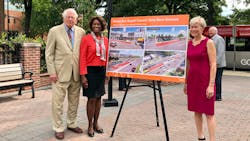Raleigh’s New Bern BRT project secures $35 million CIG grant
The city of Raleigh, N.C., received a $35 million grant through the Federal Transit Administration’s (FTA) Capital Investment Grants (CIG) program for the Wake Bus Rapid Transit (BRT) New Bern Avenue Project, which will build a 5.4-mile BRT route connecting the city’s central business district with the east side to North New Hope Road.
"Across the country, we're seeing innovative transit projects connect people to where they need to go quickly and conveniently – while reducing congestion and pollution for the entire community," said U.S. Transportation Secretary Pete Buttigieg.
The project entered Small Starts Project Development in May 2019. The city selected a locally preferred alternative in June 2019 and adopted it into a long-range plan in August 2019. The $96.7-million project is expected to take two years to build with service starting in mid-2025. The CIG grant will cover approximately 36 percent of the project’s cost with the balance covered by city and county sources.
"We are pleased to support the Wake Bus Rapid Transit New Bern Avenue project, which will improve transit connections in the downtown Raleigh Central Business District, including to some of the major healthcare centers in the region, and beyond," said FTA Administrator Nuria Fernandez. "Residents will have an affordable, climate-friendly travel alternative to avoid traffic and reach destinations all over the region."
The grant was awarded in Raleigh at an event attended by Administrator Fernandez, U.S. Reps. David Price (D-NC-04) and Deborah Ross (D-NC-02).
“These funds meet the moment of developing diverse transportation options for our rapidly growing region, ensuring our transportation networks are robust as we fight the climate crisis, expand equitable access and strengthen our nation’s infrastructure,” said Rep. Price.
Rep. Ross added, “The BRT Line is a critical step towards a future where everyone who lives in or visits this great region has reliable, affordable ways to get to their destinations. This $35 million federal outlay for bus rapid transit here in Wake County is exactly the kind of investment we envision when we say our community needs modern, 21st-century transit. From beginning to end, the new bus line will connect residents and visitors to healthcare facilities, employment, schools, housing and so much more.”
The project details
The Wake BRT New Bern Avenue Project is the first project of a large transit expansion approved by Wake County voters in November 2016 that will see 20 miles of transit lanes with four BRT lines added in the city.
Buses will operate on 3.3 miles of exclusive lanes and receive traffic signal priority. The remaining portion of the route will be in mixed traffic with service on the New Bern BRT expected to save 10 minutes in travel time from downtown to New Hope. The BRT system will feature new electric battery-powered or compressed natural gas buses and easy fare payment that will be handled before boarding, ensuring quicker stops.
The project improves access for low-income residents, older adults and underserved populations to major employers and medical facilities in the corridor including the WakeMed Raleigh campus, Duke Children's Specialty Services of Raleigh and St. Augustine’s University – all of which will have stops on the new BRT line.
About the Author

Mischa Wanek-Libman
Group Editorial Director
Mischa Wanek-Libman is director of communications with Transdev North America. She has more than 20 years of experience working in the transportation industry covering construction projects, engineering challenges, transit and rail operations and best practices.
Wanek-Libman has held top editorial positions at freight rail and public transportation business-to-business publications including as editor-in-chief and editorial director of Mass Transit from 2018-2024. She has been recognized for editorial excellence through her individual work, as well as for collaborative content.
She is an active member of the American Public Transportation Association's Marketing and Communications Committee and served 14 years as a Board Observer on the National Railroad Construction and Maintenance Association (NRC) Board of Directors.
She is a graduate of Drake University in Des Moines, Iowa, where she earned a Bachelor of Arts degree in Journalism and Mass Communication.
